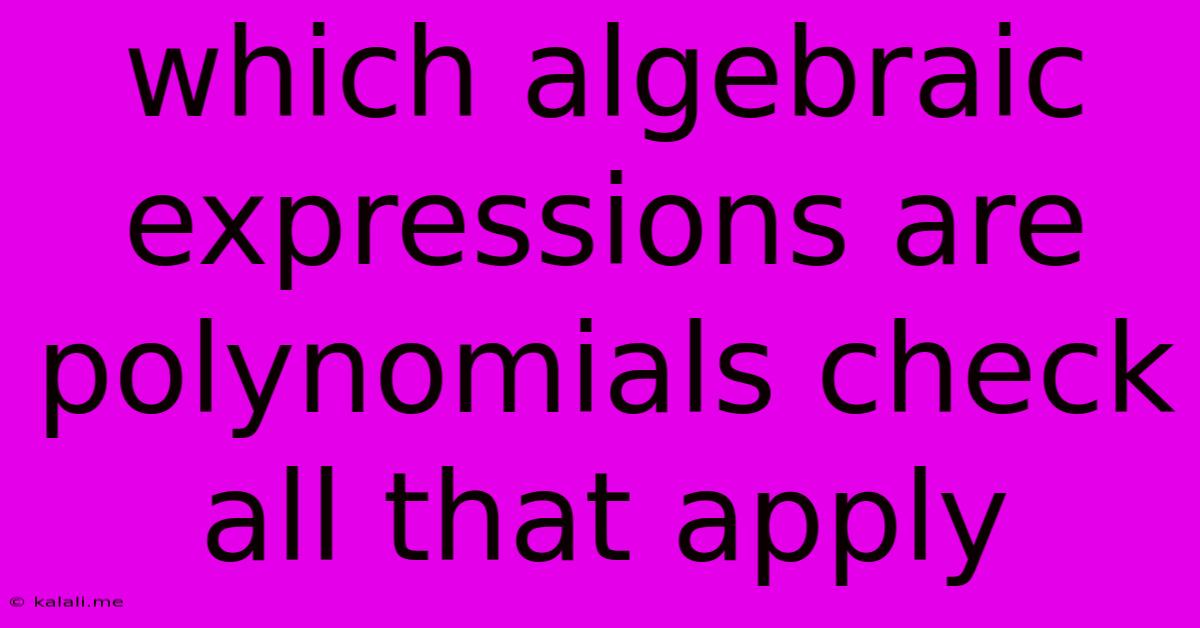Which Algebraic Expressions Are Polynomials Check All That Apply
Kalali
May 09, 2025 · 3 min read

Table of Contents
Which Algebraic Expressions Are Polynomials? Check All That Apply
This article will clarify what constitutes a polynomial expression in algebra. Understanding polynomials is crucial for various mathematical operations and problem-solving. We'll explore the defining characteristics of polynomials and help you confidently identify them among other algebraic expressions. This will also cover common mistakes and misconceptions surrounding polynomial identification.
What is a Polynomial?
A polynomial is an algebraic expression consisting of variables and coefficients, involving only the operations of addition, subtraction, multiplication, and non-negative integer exponents of variables. This seemingly simple definition holds the key to distinguishing polynomials from other algebraic expressions. Let's break down the key components:
- Variables: These are typically represented by letters like x, y, or z.
- Coefficients: These are the numerical values multiplying the variables. For example, in 3x², 3 is the coefficient.
- Exponents: These indicate the power to which the variable is raised. In 3x², the exponent is 2. Crucially, in a polynomial, these exponents must be non-negative integers (0, 1, 2, 3, and so on).
- Operations: Only addition, subtraction, and multiplication are permitted. Division by a variable is not allowed.
Identifying Polynomials: Examples and Non-Examples
Let's examine some examples to solidify our understanding:
Polynomials:
- 3x² + 2x - 5: This is a polynomial (specifically, a trinomial because it has three terms). It satisfies all the criteria: non-negative integer exponents, only addition/subtraction/multiplication involved.
- 5y⁴: This is a monomial (a polynomial with one term). It's a polynomial because it has a non-negative integer exponent.
- x + 7: This is a binomial (two terms) and a polynomial.
- -2z³ + 4z² - z + 10: This is a polynomial with non-negative integer exponents.
- 15: This is a constant polynomial (a polynomial with a constant term only).
Non-Polynomials:
- 1/x: This is not a polynomial because it involves division by a variable. This is equivalent to x⁻¹, which has a negative exponent.
- √x: This is equivalent to x<sup>1/2</sup>, which has a fractional exponent. Fractional exponents are not allowed in polynomials.
- x⁻³ + 2x: This has a negative exponent (-3), violating the rules for polynomials.
- 2ˣ: This has a variable exponent, which is not allowed. Polynomial exponents must be constants.
- x² + 1/x - 3: This expression contains division by a variable (1/x) making it not a polynomial.
Common Mistakes to Avoid
A frequent source of confusion lies in the exponents and allowed operations. Remember:
- Negative exponents are forbidden. Expressions with negative exponents, such as x⁻², are not polynomials.
- Fractional exponents are forbidden. Expressions like x<sup>1/2</sup> or x<sup>2/3</sup> are not polynomials.
- Variables in the denominator are forbidden. The variable cannot be in the denominator of a fraction.
- Variable exponents are forbidden. The exponents must be constant, non-negative integers.
By understanding these rules and carefully examining the structure of an algebraic expression, you can accurately identify which expressions are polynomials and which are not. Consistent practice with examples and non-examples will further strengthen your understanding.
Latest Posts
Latest Posts
-
Prevent An Expressway Emergency By Merging Without
Jul 12, 2025
-
How Many Grams Of Sugar In A Pound
Jul 12, 2025
-
7am To 11am Is How Many Hours
Jul 12, 2025
-
If Your 35 What Year Was You Born
Jul 12, 2025
-
How Many Cups Is 1 Pound Of Cheese
Jul 12, 2025
Related Post
Thank you for visiting our website which covers about Which Algebraic Expressions Are Polynomials Check All That Apply . We hope the information provided has been useful to you. Feel free to contact us if you have any questions or need further assistance. See you next time and don't miss to bookmark.